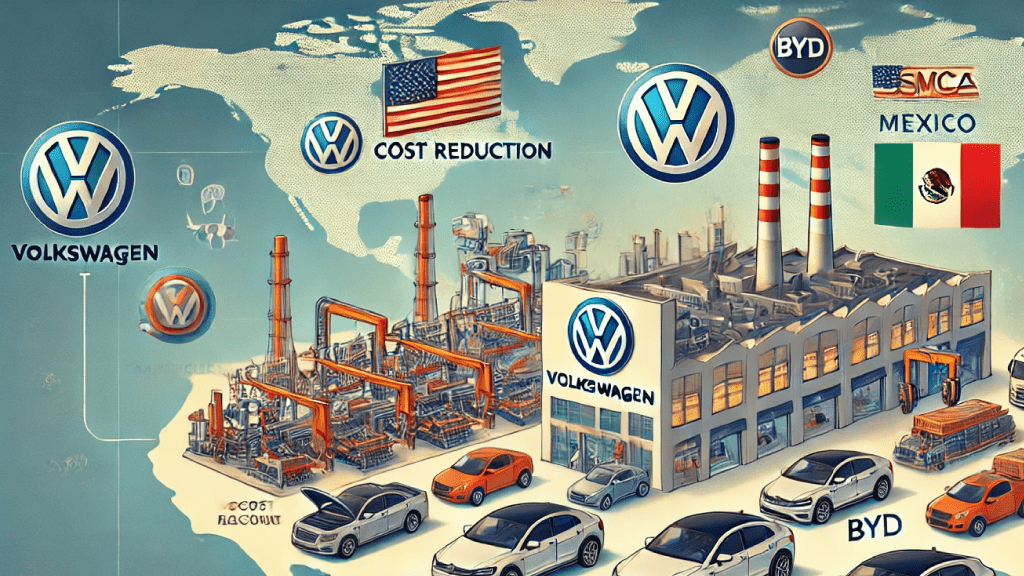Volkswagen intensifies cost cuts to try to improve profit margins

Volkswagen (VOWG_p.DE) has announced that it will need to make "significant cost-cutting efforts" in the second half of the year and beyond to improve its profit margins.
To address this situation, Volkswagen is further reducing its production capacity and modifying its software spending following its investment in electric vehicle manufacturer Rivian. The company had already reduced capacity by 25% at certain locations, including its main plant in Wolfsburg, with a broader goal of reducing capacity by 10% across Europe.
Volkswagen is revamping its global vehicle lineup with electric models designed specifically for the Chinese and U.S. markets, as it attempts to compete with the likes of Tesla and China's BYD. However, demand for electric vehicles has been slower than expected, and the company faces supply chain challenges and rising costs, despite regulatory efforts in Europe and the U.S. to keep cheaper Chinese electric vehicles out of the market.
CEO Oliver Blume mentioned that Volkswagen will prolong its combustion engine lineup, potentially adding new models to its brands without increasing total investment spending. CFO Arno Antlitz added that investment spending for 2025-2029 will be reduced to around €165 billion from the planned €180 billion for 2024-2028.
Volkswagen is in the midst of a €10 billion savings plan announced in December, with cuts of up to €4 billion expected by 2024. Some measures, such as incentivizing early retirement, will take time to take effect.
Volkswagen reported second-quarter earnings before interest and taxes of €5.46 billion, slightly down from €5.6 billion a year earlier. Volkswagen shares were down 1.6% at 1005 GMT. Operating margin at its core VW brand slipped to 5% in the first half due to restructuring costs, while returns at premium brand Audi were hit by supply chain problems.
The group plans to invest up to $5 billion in Rivian as part of a joint venture to share electric vehicle platforms and software. The collaboration has led to questions about the future of the group's software unit, Cariad, which has faced delays and losses since its inception. Investment in the unit would decline as a result of the joint venture with Rivian, according to Blume. Cariad will drive Volkswagen's efforts in entertainment and connectivity, but the next generation of the software platform will be built from the joint venture, Antlitz added.
"A (group) return (of 6.3% after six months is too low," Antlitz said in a statement. "We will have to make significant cost reduction efforts in the second half of the year and beyond to reach our targets."
Volkswagen's intensive focus on cost reduction and production optimization opens up several opportunities for Mexico. Volkswagen could consider expanding or establishing new plants in Mexico, taking advantage of lower operating costs and proximity to the U.S. market. Mexico, already a major automotive production center, could benefit from the redeployment of production capacity.
With the challenges in the global supply chain, there is an opportunity for Mexican suppliers to strengthen their position. Local companies can offer efficient logistics solutions and key components for the production of electric and traditional vehicles. Volkswagen's reduction in software spending, due to its alliance with Rivian, also opens up space for Mexican technology companies to collaborate in the development of software platforms and connectivity, areas in which Cariad will continue to work.
Given the slow growth in demand for electric vehicles, Mexico may position itself as a key emerging market. Government initiatives to incentivize the adoption of electric vehicles and charging infrastructure can attract investment and specific Volkswagen models. In addition, Mexico's proximity to the United States makes it a strategic location for vehicle exports. Volkswagen could use its plants in Mexico as production and export hubs to meet demand in North America, benefiting from the Mexico-U.S.-Canada Agreement (T-MEC).
Collaboration: Grupo Auge | Reuters (International).





